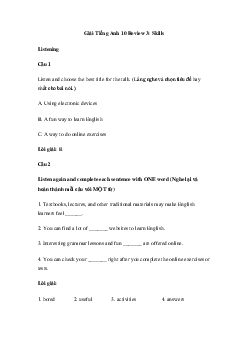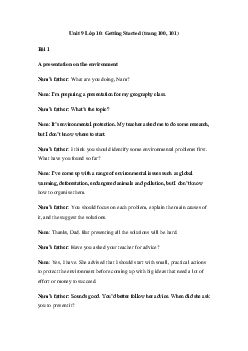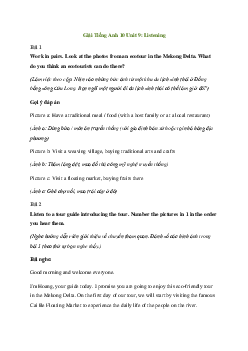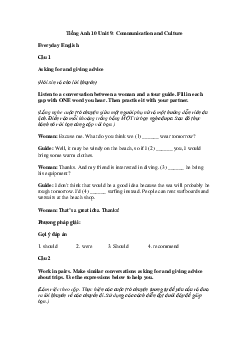










Preview text:
NGỮ PHÁP TIẾNG ANH LỚP 10
UNIT 9: PRESERVING THE ENVIRONMENT I. LÝ THUYẾT
Reported speech (Lời nói gián tiếp)
Direct speech được gọi là lời nói trực tiếpẻ
- Lời nói trực tiếp (direct speech) là lời nói khi chúng ta lặp lại nguyên văn của người nào đó.
Reported speech/ indirect speech được gọi là lời nói gián tiếp.
- Lời nói gián tiếp (reported speech) là lời tường thuật lại ý của người nói, đôi khi không
cần dùng đúng những từ của người nói. Ex: Direct speech
Peter says: “I am hungry”.
Peter nói: Tôi đói bụng”. Reported speech
Peter said that he was hungry.
Peter nói rằng cậu ấy đói bụng.
Indirect speech or Reported speech (Lời nói gián tiếp hay còn gọi là lời tường thuật)
Chúng ta sử dụng lời nói gián tiếp khi chúng ta dùng từ ngữ của mình để tường thuật lại điều mà người nào đó nói.
Muốn đổi câu mệnh lệnh, yêu cầu và đề nghị từ câu trực tiếp sang câu gián tiếp, chúng ta
phải thay đổi chủ từ, động từ và trạng từ chỉ thời gian hay địa điểm.
■ Động từ tường thuật thường được dùng là:
ordered = commanded: ra lệnh
asked = requested: yêu cầu begged: nài nỉ told: bảo
Ex: Direct: The teacher said to the students: “Sit down”.
Indirect: The teacher told the student to sit down.
Ex2: Direct: The teacher said to the students, “Don’t look at your books!”
Indirect: The teacher told the studdents not to look at their books.
Muốn đổi một câu từ trực tiếp sang gián tiếp, ta phải chú ý những nguyên tắc sau:
1) Động từ tường thuật của câu lời nói thường là say và tell.
Ex: My friend said, “I will call him tomorrow”.
—> My friend said that she would call him the day after.
2) Say to + Noun (Say to luôn luôn theo sau là một danh từ làm túc từ)
Ex: He said to his friend, “He will leave Ho Chi Minh City tomorrow”.
—> He told his friend that he would leave Ho Chi Minh City tomorrow. Lưu ý:
— Khi chuyển lời nói trực tiếp sang lời nói gián tiếp, ta chuyển said to thành told- Ngoài ra
còn phải thay đổi ngôi số của đại từ cho phù hợp.
Ex: He said, “I have to finish these exercises”
He told me that he had to finish those exercises.
— Ngoài say và tell một số động từ khác như ask, answer, exclaim, suggest,... cũng được
dùng để tường thuật tùy theo ý nghĩa của câu lời nói.
3) Khi đổi một câu từ trực tiếp sang gián tiếp ta phải lùi thì DIRECT SPEECH INDIRECT SPEECH Present simple Past simple
Jerry said, “I never eat chicken.”
Jerry said that she never ate chicken.
Present simple progressive Past progressive
She said, “I’m looking for the books.”
She said she was looking for the books. Present perfect Past perfect
He said, “I’ve watched that film.”
He said he had watched that film.
Present perfect progressive
Past perfect progressive
Mark said, “I’ve been learning Japanese for Mark said he had been learning Japanese for 4 4 years.” years. Past simple
Past simple/ Past perfect
Mai said, “I went to the zoo by bus.”
Mai said she went/ had gone to the zoo by bus. Past Progressive
Past progressive/ Past perfect progressive
Cherry said, “I was sitting in the park at 9 Cherry said she was sitting/ had been sitting in o’clock.” the park at 9 o’clock. Past perfect Past perfect
Diana said, “My money had run out.”
Diana said her money had run out. Future simple Future in the past
July said, “I will phone you.” July said she would phone me. Future Progressive
Future progressive in the past
Thomas said, “I will be playing football
Thomas said he would be playing football tomorrow.” tomorrow. Modal verbs Modals in the past + Can + Could
He said, “You can sit there.” He said we can sit there. + May + Might
Tram said, “I may go to the museum.”
Tram said she might go to the museum. + Must + Must/ Had to
Hoa said, “I must finish this report.”
Hoa said she must/ had to finish this report.
4) Thay đổi trạng từ chỉ thời gian.
Trạng từ chỉ thời gian trong lời nói trực tiếp được biến đổi thành trạng từ khác trong lời nói gián tiếp. this —> that these —> those here —> there now —> then today —> that day tonight —> that night ago —> before this week —> that week
yesterday —> the day before
the day before yesterday —> two days before
last week — > the week before; the previous week ago —> before
This + noun —> That + noun
These + nouns —> Those + nouns
This chỉ thị đại từ đứng một mình sẽ chuyển thành it.
These chỉ thị đại từ đứng một mình sẽ chuyển thành them.
Ex: Lan said, “I have seen this film.”
Lan said that she had seen that film.
He said, “ I bought these for you, Nga.”
He told Nga that he had bought them for her.
She said, “I met him yesterday.”
She said that she had seen him the day before.
Lưu ý: Trong các trường hợp sau đây thì động từ trong lời nói trực tiếp sẽ không thay đổi.
a) Động từ tường thuật ở thì tương lai đơn và các thì hiện tại (Hiện tại đơn, hiện tại hoàn
thành, hiện tại tiếp diễn)
Ex: Lan says: “I am arriving at. about 6.00 a.m.”
Lan says she’s arriving at about 6.00 a.m
b) Lời nói trực tiếp diễn tả chân lý.
Ex: My teacher said, “The earth moves around the sun.”
My teacher said that the earth moves around the sun.
c) Câu đi với cấu trúc would rather + subject + simple past và cấu trúc It’s high time + subject + simple past
Ex: He said, “I'd rather Lan took me to the airport.”
He said that he would rather Lan took him to the airport.
His father said, “It’s high time you went to bed, Hung.”
His father told Hung that it was high time he went to bed.
d) Câu đi với cấu trúc wish và câu điều kiện loại 2 và loại 3 khi chuyển sang lời nói gián tiếp
cũng không thay đổi thì.
Tóm lại để chuyển từ một câu trực tiếp sang câu gián tiếp, ta phải chú ý sáu bước sau:
1.Sử dụng một số động từ tường thuật: say, tell, ask, answer, exclaim, suggest...
2. Thay đổi thì của động từ.
3. Thay đổi ngôi, sô' của đại từ.
4. Thay đổi trạng từ chỉ thời gian.
5. Thay đổi trạng từ chỉ nơi chốn.
6. Thay đổi tính từ sở hữu, đại từ sở hữu, đại từ phản thân. II. LUYỆN TẬP
1. Put the following sentences into reported speech:
1. He said, “ I am going to town with my sister”
………………………………………………………………………………………………….
2. He said to her, “ You are wearing your best clothes”
…………………………………………………………………………………..
3. They said, “We are unlucky today”.
………………………………………………………………………………………………….
4. She said to me, “I want to speak to your brother”
………………………………………………………………………………………
5. She said, “I have helped my mother”
………………………………………………………………………………………………….
6. John said to Mary, “She is ready to go with us”
………………………………………………………………………………………………….
7. She said to me, “They do not know you”
………………………………………………………………………………………………….
8. He said, “ I shall answer the phone”
………………………………………………………………………………………………….
9. She said to them, “You can do it if you try”
………………………………………………………………………………………………….
10. He said, “He has done his homework well”
………………………………………………………………………………………………….
1. He told that he was going to town with his sister.
2. He told her that she was wearing her best clothes.
3. They told that they were unlucky that day.
4. She told me that she wanted to talk with my brother.
5. She told that she had helped her mother.
6. John told Mary that she was ready to go with them.
7. She told me that they did not know me.
8.He told that he would answer the phone.
9.She told them that they could do it if they tried.
10. He told that he had done his homework well.
2. Choose the correct sentence.
1. “My mother has just had a baby,” said Mary
A. Mary said that her mother had just had a baby.
B. Mary said that my mother had just had a baby.
C. Mary said her mother has just had a baby.
D. Mary said my mother has just had a baby.
2. "I have found a new flat today ," said Ann.
A. Ann told to me that she had found a new flat today .
B. Ann said that she had found a new flat that day.
C. Ann said to me that she had found a new flat this day .
D. Ann said that she has found a new flat the day before .
3.“I left my umbrella here last night”, said Jane
A.Jane said me that she had left her umbrella there the previous night.
B.I told Jane I had left my umbrella there the night before.
C.Jane told me she had left her umbrella there the night before.
D.Jane asked me to leave the umbrella there the previous day.
4. "I saw her in the park two hours ago,” said he.
A. He said I had seen her in the park two hours before.
C. He said he saw her in the park two hours before
B. He said he had seen her in the park two hours before.
D. He said I saw her in the park two hours before.
5. "I'm leaving here for Da Lat next week " said Mrs Lan.
A. Mrs Lan said she was leaving there for Da Lat the following week.
B. Mrs Lan said to me she was leaving there for Da Lat next week.
C. Mrs Lan tells she is leaving here for Da Lat the following week.
D. Mrs Lan told me that I was leaving there for Da Lat the week after .
6. “ I haven’t received your post since last month, Jane”. The boss said.
A. The boss said that Jane hadn’t received his post since the previous month.
B. The boss said Jane that he hadn’t received her post since the previous month.
C. The boss said to Jane that he hadn’t received her post since the previous month.
D. The boss said Jane that he hadn’t received his post since the previous month.
7. Charlie said, "Tom had an accident last week but he wasn't injured".
A. He said Tom had an accident the week before but he wasn't injured.
B. He said Tom had had an accident the previous week but he wasn't injured.
C. He said Tom had had a accident the previous week but he hadn't been injured.
D. He said Tom had an accident the following week but he hadn't been injured.
8. Tony said, "I have never been to London. I think I shall go there next year".
A. Tony said he has never been to London and he thinks he would go there the following year.
B. Tony said he had never been to London and he thought he would go there the following year.
C. Tony said he had never been to London and he thinks he will go there the following year.
D. Tony said he would have never been to London and he thought he would go there the following year.
9. Barbara said, "I saw them at my parents' house last year"
A. Barbara said I had seen them at my parents' house last year.
B. Barbara said she saw them at her parents' house the previous year.
C. Barbara said she had seen them at her parents' house the previous year.
D. Barbara said they had seen her at her parents' house the previous year.
10. Cindy said that “I haven’t seen John since last month.”
A. Cindy said she hasn’t seen John since the previous month
B. Cindy said she hadn’t seen John since the previous month
C. Cindy said she wasn’t seen John since the previous month
D. Cindy said she doesn’t see John since the previous month
11. Charlie said, "I'm thinking of going to live in Canada".
a. Charlie said that I was thinking of going to live in Canada.
b. Charlie said that I am thinking of going to live in Canada.
c. Charlie said that he was thinking of going to live in Canada.
d. Charlie said that he is thinking of going to live in Canada. 12.
Charlie said, "My father is in hospital".
a. Charlie said that my father is in hospital.
b. Charlie said that his father was in hospital.
c. Charlie said that his father is in hospital.
d. Charlie said that my father was in hospital.
13. Charlie said, "Nora and Jim are getting married tomorrow
a. He said that Nora and Jim are getting married tomorrow
b. He said that Nora and Jim were getting married the next day.
c. He said that Nora and Jim were getting married tomorrow.
d. He said that Nora and Jim are getting married the next day.
14. Charlie said, "I haven't seen Bill for a while".
a. He said that he hadn't seen Bill for a while.
b. He said that I haven't seen Bill for a while.
c. He said that he hasn't seen Bill for a while.
d. He said that I hadn't seen Bill for a while.
15. Charlie said, "I've been playing tennis a lot recently"
a. Charlie said that I've been playing tennis recently.
b. Charlie said that he had been playing tennis recently.
c. Charlie said that he had bee playing tennis recently.
d. Charlie said that I had been playing tennis recently
16. Charlie said, "Margaret has had a baby".
a. Charlie said Margaret has had a baby.
b. Charlie said Margaret had had a baby.
c. Charlie said Margaret had a baby.
d. Charlie said Margaret has a baby.
17. Charlie said, "I don’t know what Fred is doing".
a. He said that he doesn’t know what Fred is doing.
b. He said that he didn’t know what Fred is doing.
c. He said that he doesn’t know what Fred was doing.
d. He said that he didn’t know what Fred was doing.
18. Charlie said, "I hardly ever go out these days".
a. He said that he hardly ever went out these days.
b. He said that I hardly ever go out these days.
c. He said that I hardly ever went out these days.
d. He said that he hardly ever goes out these days.




